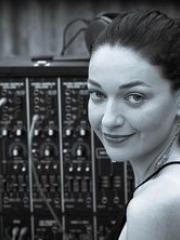
Researcher biography
Drawing together traditional and experimental classical music, interactive performance art, and research, Dr Eve Klein finds new ways of immersing contemporary audiences music forms. Using large-scale, immersive music experiences at festivals and venues including VIVID Sydney, MONA FOMA, and New York University, Klein expands the boundaries of performance and creation, considering the possibilities for the intertwining influence of technology and music, as well as the role of women in the industry.
Video excerpt for Vocal Womb, Klein’s multimedia opera performance and installation “externalising the hidden, fleshy and deeply personal workings of the voice from inside a singer’s body”. More information here.
“Classical music has resisted incorporating music technologies into its mainstream compositional practices, in part because technology allows greater access to the techniques and timbres associated with virtuosic human acoustic performance,” Klein said in a paper at CreateWorld 2015: A Digital Arts Conference. “However, classical music composition and production can be enabled by music technologies, and they offer an effective vehicle for women to test and occupy the role of composer, performer and producer.”
Working as an artistic researcher, lecturer, music technologist, composer, and opera singer, Klein draws together these experiences, as a Senior Lecturer in Music Technology and Popular Music at The University of Queensland.
Klein leads a research cluster in interactive composition at The University of Queensland, focusing on guiding postgraduate composers in creating virtual and augmented reality works. In creating these works, Klein explores perceptions of classical music institutions and how they’re reimagined in digital spaces for both performers and audiences, intertwining with questions of identity.
Klein explores these ideas in Performing Nostalgia On Record: How Virtual Orchestras And YouTube Ensembles Have Problematised Classical Music, where she examines two case studies (virtual orchestras and YouTube), to “illustrate the tensions that arise when performance and technology intersect within the classical genres …. problematis(ing) traditional notions of classical music performance”.
At the 2020 Australasian Computer Music Conference, Klein speaks on the gender divide in computer music, its causes, and influences.
“Virtual orchestras simulate orchestral timbres in increasingly convincing ways, reducing or removing the need for human players … (threatening how) classical music institutions have used performance as a means of regulating the tradition via the demonstration of virtuosic human craft. Similarly, YouTube ensembles disregard ideals of elite individual performance and the concert hall environment in favour of mass participation and online access … what these case studies show is that performance virtuosity, as a marker of quality, has been unsettled by the accessibility of orchestral sonorities and the drive towards participatory cultures of classical music.”
At the 2019 UQ Humanities for the Future event, Klein explored the ability to have conversations about culture and identity through music and technology.
These interests continue through Klein’s previous research, which spans the impact of human interaction design on performance and composition, recording practices, and technology-enabled performance.
